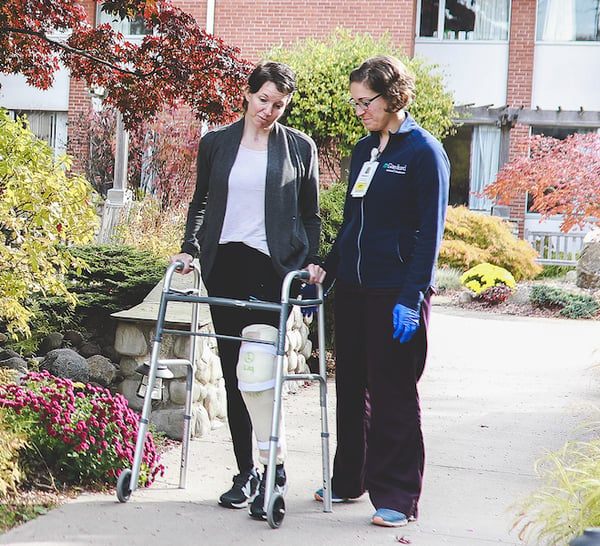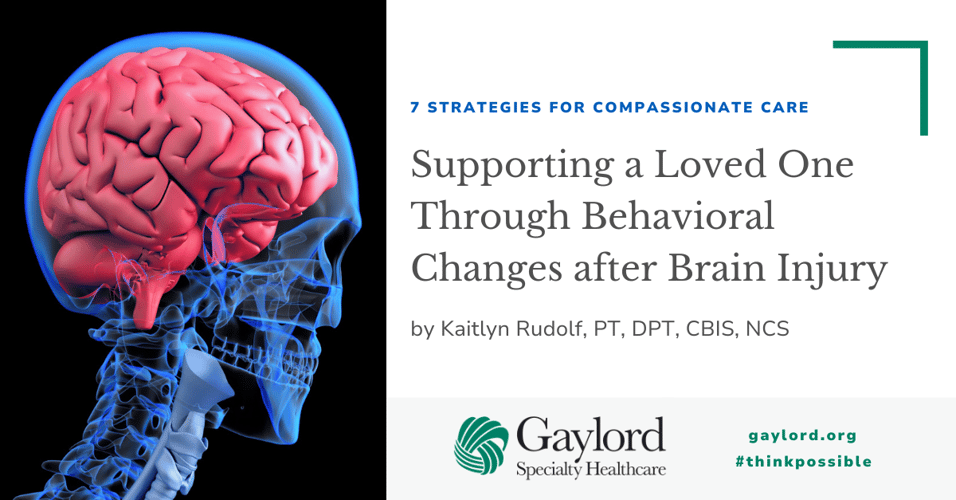
Being a caregiver for a loved one with a traumatic brain injury (TBI) can be an overwhelming challenge, filled with uncertainties and changes.
Dorene Scolnic, LCSW, CCTSW, a licensed social worker at Gaylord Hospital, acknowledged that families caring for someone with TBI often face a multitude of unique challenges, including managing their loved one's physical issues, understanding their changes in thinking and shifts in behavior, and dealing with communication problems.
"It's important to understand that when someone has a life-altering event like a TBI, the entire family is affected," Scolnic said. "It's not unusual for family members to experience some level of frustration, anger or difficulty adjusting to the changes in their loved one's thinking or personality throughout the recovery process."
Scolnic offered some strategies to help family caregivers support their well-being:
1. Embrace patience and persistence
Recovery from a brain injury is a gradual process and is unique to each individual. With no predictable timeline, recovery can take months or even years. Try to cultivate patience and persistence and maintain a positive attitude. "Every step, no matter how small, contributes to progress," Scolnic says. "Think of it as a marathon – each milestone is a victory."
2. Ask for help when you need it
You don't have to do everything alone. Putting too many responsibilities on yourself can quickly become overwhelming. Ask for help from family, friends, or external resources.
3. Establish a consistent routine
Creating a predictable routine based on your loved one's evolving needs can provide stability, reduce anxiety, and establish a sense of security. Use a notebook to plan and log events and essential information. This practice provides a reference for daily details and helps individuals with TBI feel more in control.
4. R-E-S-P-E-C-T spreads positivity
Avoid treating the person with a brain injury differently. Families may unintentionally talk down or express pity, undermining the individual's sense of adulthood. Treat them with the respect they deserve and foster a positive for their recovery and your environment.
5. Consider the "new normal"
"Life post-TBI can be a new normal," says Scolnic. "Letting go of expectations tied to the past can be challenging, but it is essential for adapting to the changes and focusing on the individual's current abilities."
6. Prioritize self-care
It's not uncommon for caregivers to neglect their well-being. Taking care of yourself is crucial for your health and enables you to provide better care to your loved one by helping you manage stress, handle intense emotions, and focus on the positives. Exercise, eat nutritious meals, practice relaxation techniques, and continue to follow up with your doctor appointments.
7. Express yourself
Keep a journal to express your thoughts and feelings. The caregiving journey can be emotionally taxing, and having an outlet for your own emotions is essential for your mental health.
8. Enhance communication
Ensure your loved one's attention is focused before initiating a conversation or task. Clear communication can alleviate frustration for all and enhance cooperation. Encourage open dialogue about feelings, concerns, and goals with your loved one. Understanding their perspective is crucial for providing adequate support.
9. Seek professional support
Seeking professional assistance ensures you're equipped with the right resources and strategies. Scolnic recommends finding free resources like Gaylord Hospital's Acquired Brain Injury Support Group, which offers emotional support, practical advice, and a valuable space for caregivers to share experiences and trusted tips. Click here for more details.
10. Educate yourself about TBI
Finally, learn as much as you can about traumatic brain injuries, their effects, and the potential challenges your loved one may face. Understanding the medical aspects of TBI can empower you to make informed decisions, advocate for the best care, and adapt your support strategies accordingly.
Navigating the complexities of life with a loved one who has experienced a traumatic brain injury requires resilience, understanding, and a supportive network. By embracing patience, fostering respect, and prioritizing self-care, family caregivers can contribute significantly to their loved one's journey toward recovery.
Remember, every small step is a step in the right direction!
Looking for more tips on supporting a loved one through behavioral changes after a brain injury? Read our article, "Supporting a Loved One through Behavioral Changes," to learn how understanding and responding to these changes can help create a calm, supportive environment for both you and your loved one.
Want more information on how to support a loved one through behavioral changes after a brain injury? Check out this blog, Supporting a Loved One through Behavioral Changes after Brain Injury, and learn how understanding and responding to these shifts can create a calm, supportive environment for both you and your loved one.
This content is for educational purposes only and is meant to provide general information. It is not a substitute for professional medical advice, diagnosis, or treatment. Always consult your healthcare provider with any questions or concerns about your health. In case of a medical emergency, contact your doctor or call 911 right away.
Related posts


